Listen to this story
The world of whisky has a problem.
It is no secret that, for centuries, much of the spirit’s finest production has taken place in Scotland. The very word “whisky” derives from the Scottish Gaelic “uisge beatha” (“water of life”), while the term “Scotch” is widely perceived to denote a prestigious, superior beverage.
New policies recently considered by the Scottish government, however, could jeopardize this long-held distinction. A proposed ban on the sale of a key raw material used in the production of many of Scotland’s best whiskies would, opponents say, alter the character of the national drink beyond recognition, threatening its world-leading status — not to mention thousands of jobs and billions of dollars in revenue. Even without an outright ban, pressure is mounting on the whisky industry to reform or abandon its use of this raw material of its own accord. The root of the issue is environmental, pitting climate concerns against substantial economic interests, as well as age-old rural Scottish tradition, culture and heritage. For whisky lovers around the globe, the alarming question is raised: Is their cherished Scotch destined, sooner or later, to lose its signature taste forever?
In search of answers to this question, New Lines traveled to the remote island of Islay, in the Hebrides archipelago off the west coast of the mainland, closer to Northern Ireland than the nearest Scottish city of Glasgow. With a population last counted at just over 3,200 in 2011, Islay has been dubbed Scotland’s “Whisky Island” on account of its nine world-famous, award-winning distilleries — one for every 356 residents.
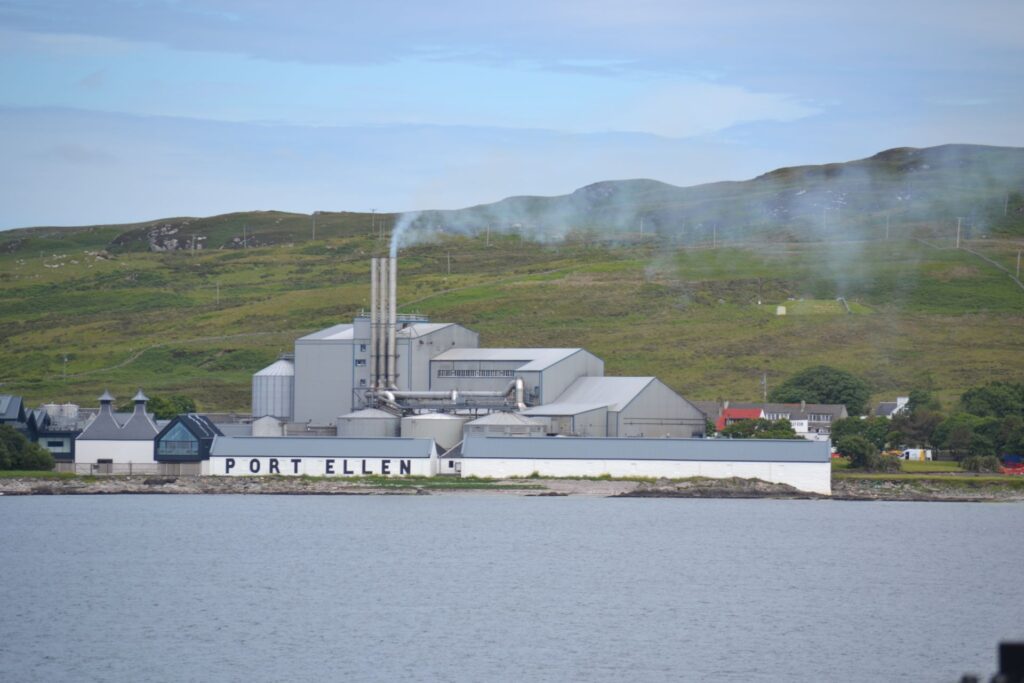
Islay (pronounced “eye-la”) is also at the epicenter of the environmental controversy, for it is here more than anywhere else that is associated with the use of the contentious material. That material is peat: a naturally occurring substance formed by decomposing vegetation and other organic matter over the course of decades, centuries and even millennia. Some 20% of Islay’s landmass is peatland, mostly located in the low-lying, boggy, often waterlogged terrain near the coast, as opposed to the firmer, rockier high ground further inland.
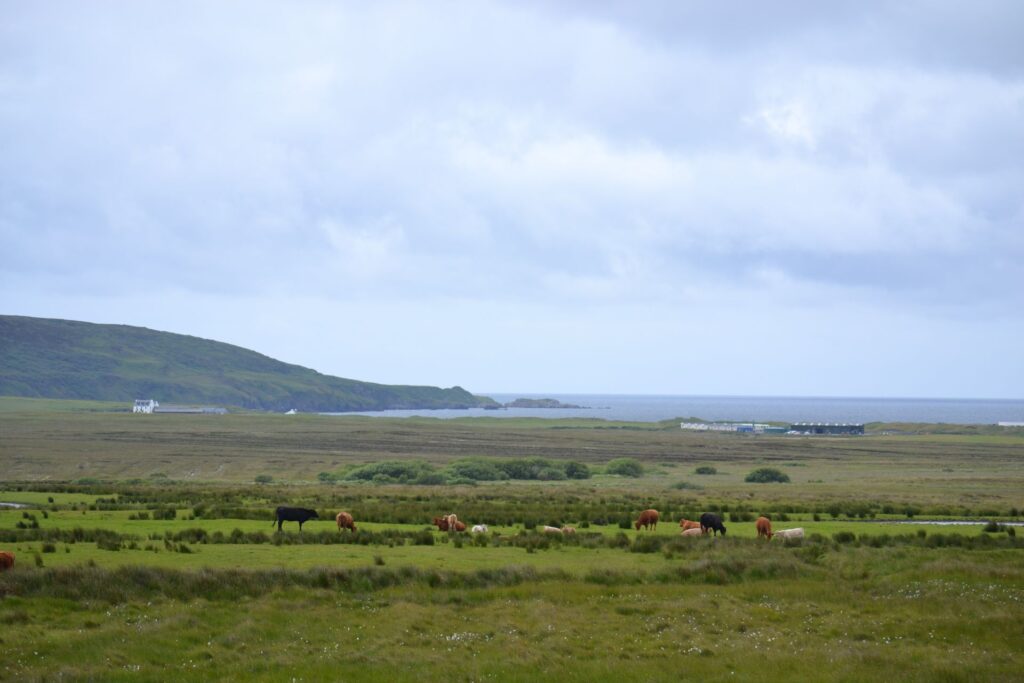
When dug up, dried and burned, peat provides a warm and aromatic fire. Since time immemorial, it has been the prime source of fuel and heating on Islay, where there is no coal and few trees to offer alternatives. For hundreds of years, Islay’s whisky distillers have also burned peat to dry out the barley they use to create their spirit. As they do so, the smoke from the peat imparts a sharp tang to the barley, manifesting in the final product as a deeply pungent flavor and fragrance known as “peat reek,” often described variously as smoky, saline, earthy, herbal and medicinal.
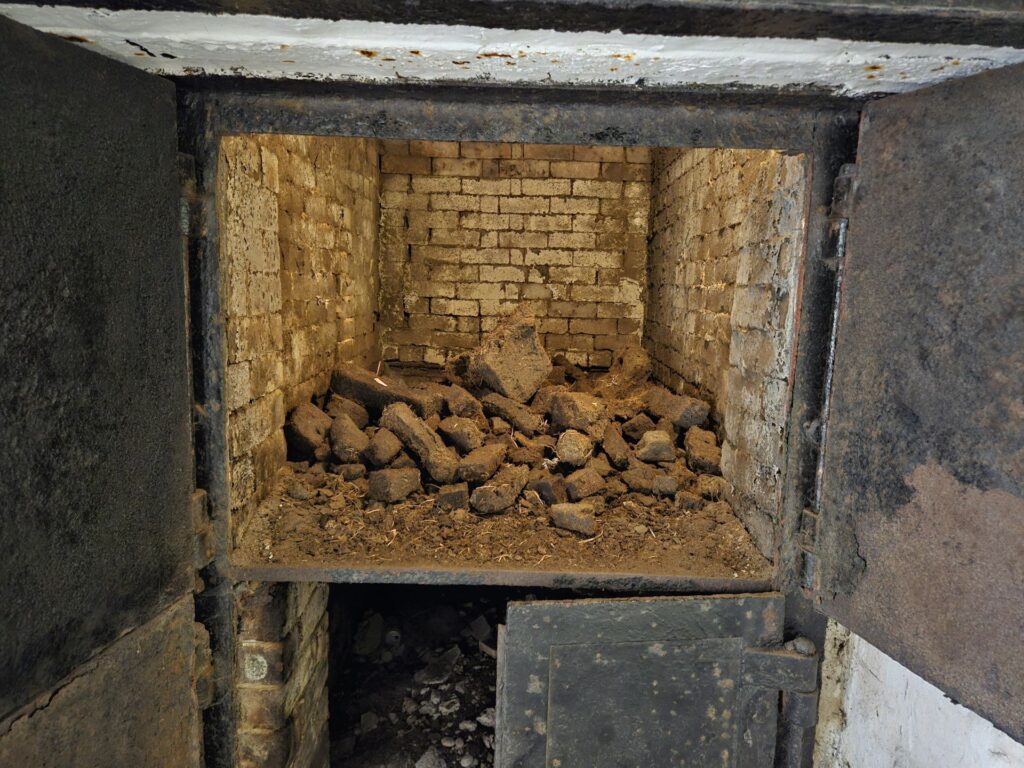
This distinctive peaty character has long defined Islay whisky and earned it popularity, not just with the connoisseurs nosing high-priced single malts in oddly shaped glassware but also the large commercial blenders who combine different whiskies to produce the familiar brands found in bars and supermarkets around the world. Whenever the latter wish to stiffen up a weak or bland recipe, they know they need only add a punch of invigorating Islay malt to the mix. Anyone noting hints of smoke in their glass of Johnnie Walker, for example, is likely detecting the input of Islay’s Caol Ila distillery, which is the island’s exclusive supplier to the world’s bestselling Scotch blend. (Both companies are owned by the Diageo corporation.) Not quite all of Islay’s whiskies are peaty, nor is it the only place in Scotland where peat is used. But it is on Islay that the peatiest Scotch of all is made. In the words of Mike Billett, author of “Peat and Whisky: The Unbreakable Bond,” the island is “the spiritual home of peated whisky.”
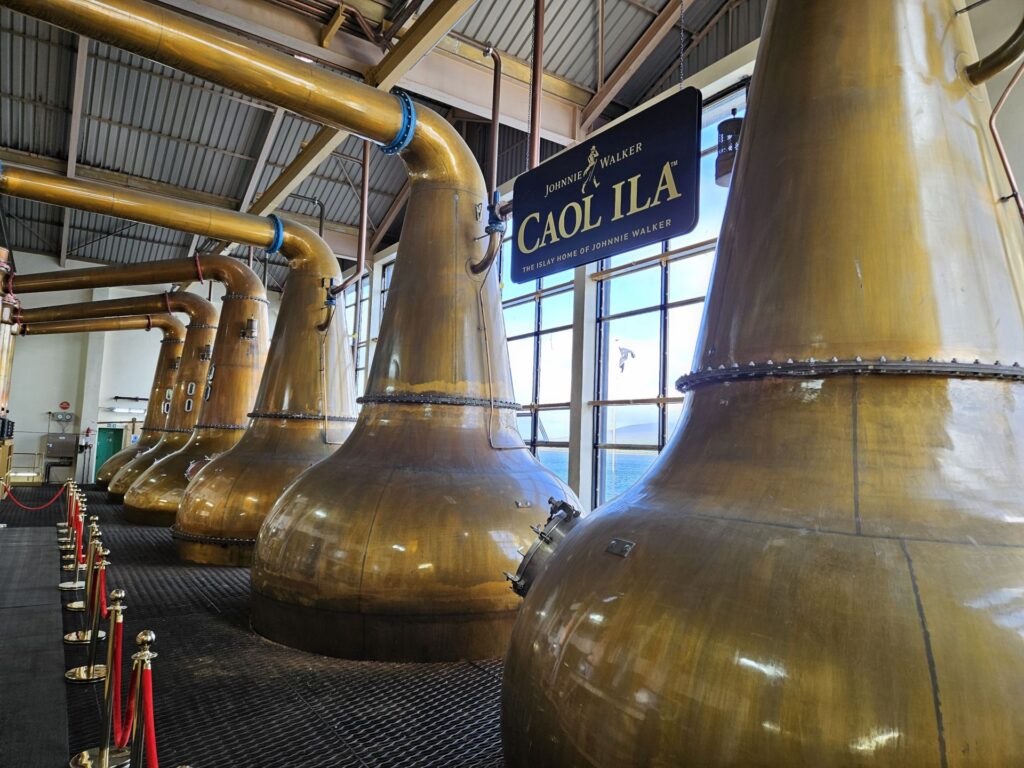
Why is any of this problematic? For a start, peat is, in effect, a nonrenewable resource, even if it is technically possible to create more of it. So lengthy is the time required for it to form — a decade for each centimeter, or a millennium for a meter — that, for centuries, it has been disappearing much faster than it has been regenerating. Perhaps it is true, as the tour guide at Islay’s Lagavulin distillery told New Lines, citing a University of Glasgow study, that Islay still has 14,000 years’ worth of peat left before it runs out. But run out it will, eventually, so long as people continue to remove it.
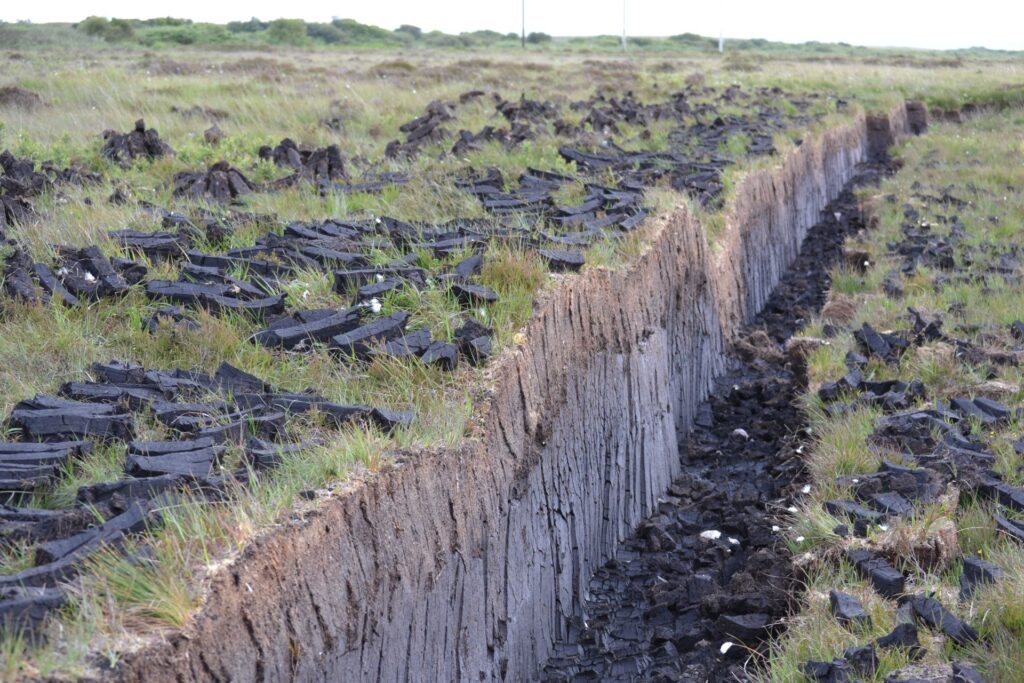
Of more immediate concern today, however, are the extraordinary and manifold environmental advantages to leaving peat undisturbed in the ground. For the task of reducing global net carbon emissions, nature offers few assets more valuable than peatlands. By sucking carbon dioxide out of the atmosphere and sealing it in their watertight embrace, they retain carbon more effectively than even the celebrated rainforests. Indeed, despite making up just 3% of the world’s landmass, peatlands store more than twice as much carbon as all the planet’s forests combined. By itself, the peat-rich region of northern Scotland known as the Flow Country holds more than double the carbon of all the forests in the United Kingdom.

And this is not to mention the important role played by peatlands in supplying most of Britain’s drinking water and the extensive biodiversity of the peatland ecosystem, home to a wide range of rare species. Suffice it to say that, from an environmental perspective, there are compelling reasons not to dig peat out of the ground and set it on fire.
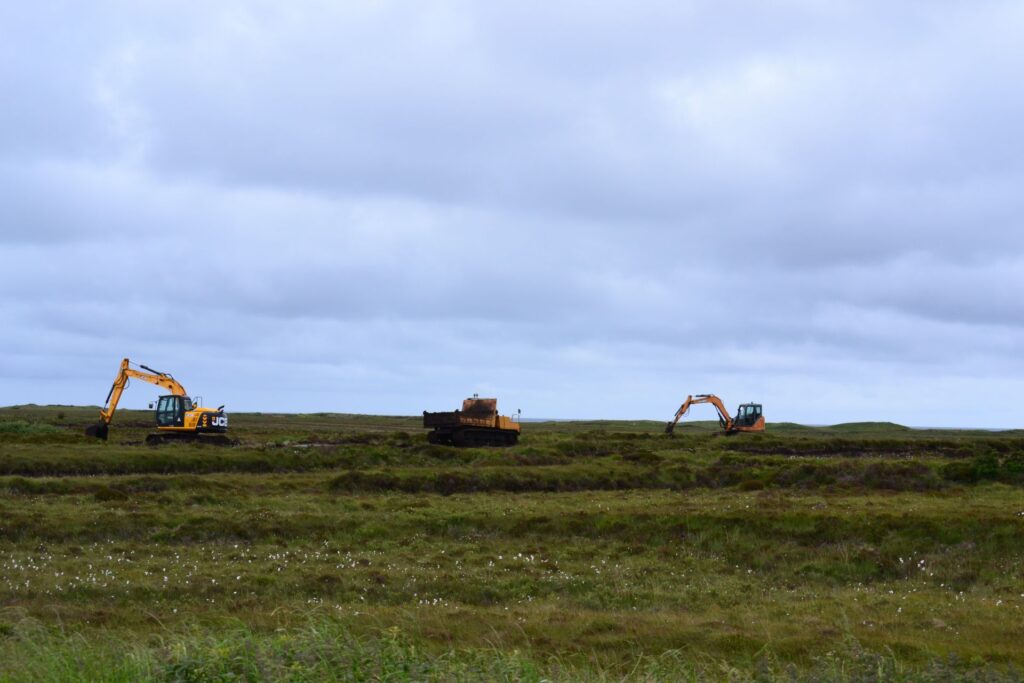
Nor is the problem limited merely to the extraction of peat. Even if left in the ground, peat will only retain carbon well when sufficiently wet. If it dries up, it degrades, releasing its payload of carbon back into the atmosphere, turning peatlands from carbon stores into “carbon bombs,” to quote Angela Gallego-Sala, professor of ecosystems and biogeochemical cycles at the University of Exeter. This is no minor detail: More than 80% of Scotland’s peatlands are degraded, according to official data. Driving around the bogs of Islay, New Lines did not have to venture far to find long trenches of cracked, desiccated brown turf scarring the otherwise green landscape: the hallmark of hazardous, carbon-emitting peat.
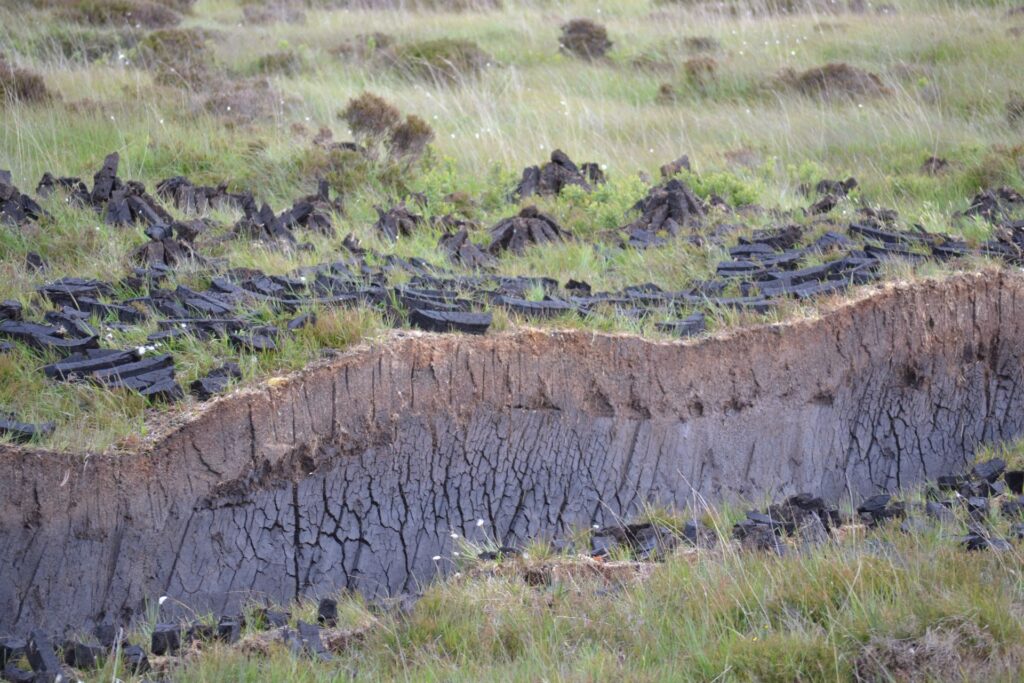
“If we want to reach net zero, we cannot have peatland emitting all those massive amounts of carbon back to the atmosphere,” Gallego-Sala told New Lines.
In an effort to address this, Scotland’s government (which enjoys a degree of autonomy from London) recently said it was spending the equivalent of $316 million to restore 618,000 acres of peatlands by 2030. Mindful, perhaps, of the growing scrutiny of their peat consumption, whisky-makers themselves are increasingly dabbling in restoration efforts of their own. Suntory Global Spirits — the New York-headquartered firm that owns Islay’s celebrated Laphroaig and Bowmore distilleries, as well as such major American names as Jim Beam, Maker’s Mark and Knob Creek — has launched a multimillion-dollar “Peatland Water Sanctuary” initiative aimed at restoring approximately 3,200 acres of Scottish peatland by 2030. This, the company says, will create as much new peat every year as its distilleries use while making whisky. Separately, the aforementioned Lagavulin has partnered with the Royal Society for the Protection of Birds to restore 700 acres of peatland on Islay.
Yet the Scottish government may go much further than restoration. In 2023, it explored the possibility of banning the sale of peat altogether. Over three months, it conducted a formal public consultation asking more than 550 respondents — including representatives of the whisky industry — how a peat ban would affect them, if implemented.

Its findings, published in an 80-page report, show it considered the issue from many angles. Much of the focus was on horticulture, which accounts for the majority of peat use in Scotland. Yet respondents living in more remote and rural regions — the Highlands and Islands — spoke of socioeconomic and cultural aspects of peat that are often overlooked by inhabitants of cities and towns. Several noted that, in peripheral locales such as the Hebrides, Orkney and Shetland, where gas and electricity are not always available and there are few trees for firewood, peat has long been — and remains today — the most convenient and affordable source of fuel. In certain circumstances, such as during power cuts caused by storms, local peat offers the sole means of heating homes.
“The poorest people in the Highland region will suffer the most if there is a ban on selling peat,” one respondent said. “Peat has not only been traditionally used to heat our homes for generations, but it still provides the most cost-efficient way to heat our homes due to how long and hot it burns in conjunction with coal. Removing the ability to buy peat for heating would devastate communities in the Highlands and put the lowest-income homes at risk of not being able to heat their homes due to the price of coal and wood.”
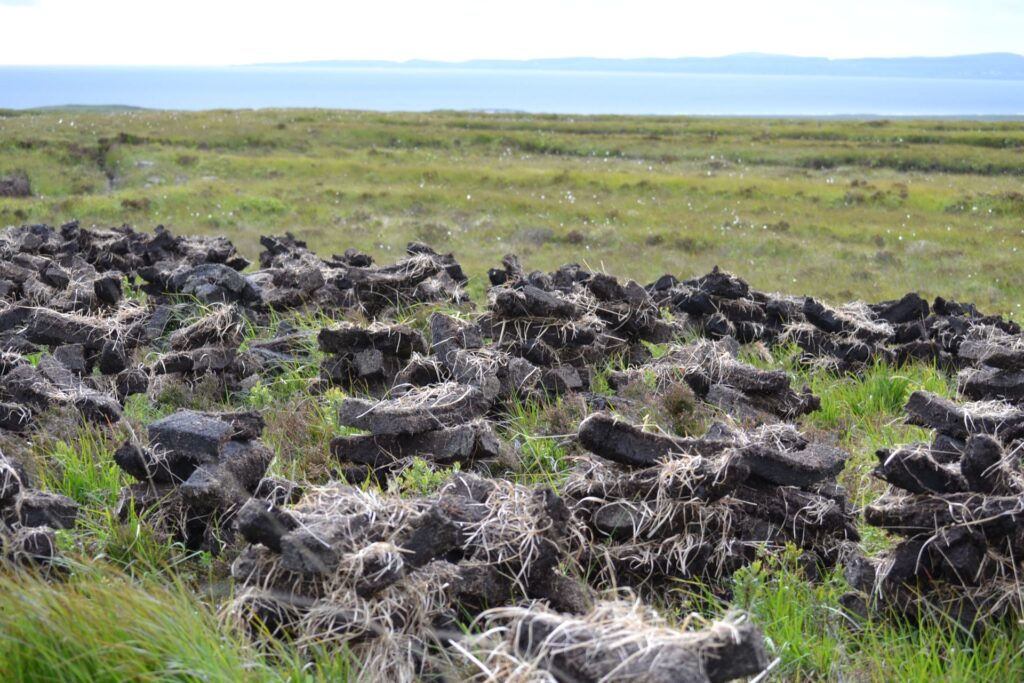
Another respondent said, “Peat use is on my doorstep — everything else contributes massively to climate impact. … My peat comes from less than a mile [away]. It cooks my food, heats my house, heats my water, dries my clothes. It keeps me independent of the global system that is wrecking the planet.”
Others added that the annual trip to the bog to cut and dry small quantities of peat for personal use was part of “long-standing tradition” and “our custom and culture” in the Highlands and Islands.

As for the whisky industry, its representatives were unanimous in opposing a peat sale ban, warning of dire consequences if one came to pass, not just for their businesses but for the U.K. economy as a whole. Whisky, they said, contributed over $5 billion to the British economy, supporting more than 42,000 jobs in Scotland, including 7,000 in rural communities. And peat, they argued, is an indispensable linchpin of the production process, “essential” to making not just many single malts but also “the vast majority” of blended Scotch, according to the Scotch Whisky Association, the industry’s main trade organization. If the sale of peat were banned, “the majority of Scotch whisky could not be produced,” a representative of the association said, and would lead to “the end of many key brands and numerous jobs across Scotland.”
It appears these concerns may have been heard in Edinburgh. In an email to New Lines in July 2024, Scotland’s minister for agriculture and connectivity, Jim Fairlie, said the government was “committed to a ban on the sale of horticultural peat” but would seek to “minimise any impact on non-horticultural users of peat” — such as whisky producers. A government source elaborated to New Lines that the whisky industry was likely to be exempted from the proposed ban, though they were unable to confirm this at the time of writing. The government, they said, was expected to make an announcement to the Scottish Parliament regarding the matter in the fall of 2024 .
On a sunny June morning that showcased Islay’s lime greens and crystal blues at their brilliant best, New Lines arrived at the Bruichladdich distillery on the western side of the island, by the pale sand beach lining the vast bay known as Loch Indaal.

Among other things, Bruichladdich produces the Octomore, the most heavily peated whisky in the world (as measured by the level of phenolic compounds in its barley). Somewhat surprisingly, the peat used to make it comes not from Islay but Aberdeenshire, on the Scottish mainland. Extracted by a company called Northern Peat & Moss, the peat gets sold to another company in Inverness — also on the mainland — called Bairds Malt. The latter uses the peat to smoke barley, which it then ships to Bruichladdich on Islay, among many other distilleries. (Chivas Brothers, owner of the major Chivas Regal, Ballantine’s, Royal Salute and Glenlivet brands, is another Bairds Malt client.) As might be expected, Bruichladdich’s brand education and academy manager, Robert McEachern, told New Lines a ban on peat sales would be detrimental to the business.
“Fifty percent of the whisky we produce is peated,” he said, which meant that a ban would “have a massive impact on us. … Fifty percent of our spirit production would have to be changed.”

Yet McEachern didn’t think the ultrapeaty Octomore itself would necessarily need to be discontinued.
“Octomore almost sort of transcends the whisky category,” he told New Lines. “We can do anything we want with Octomore. We’ve got experiments in the warehouse right now, there’s really crazy stuff going on with Octomore. It’s the heaviest-peated whisky in the world, but if it changed overnight, Octomore wouldn’t die. It would still be a thing, we’d just do something different, something cool with it.”
Like others with whom New Lines spoke, however, McEachern stressed the culture shock that would accompany a peat sale ban for Ileachs (Islay natives) such as himself.
“I grew up in a house 50 yards from us here. Our fire was peat-fired most of my youth. Culturally, to a place like Islay, [it would be] a massive, massive change, and it would be sad.”
Twenty minutes by car further inland to the west, overlooking the wind-lashed beaches of Islay’s Atlantic coast from fields of sheep on higher ground, New Lines met Anthony Wills, founder and managing director of the Kilchoman distillery. A relative newcomer on the scene, started in 2001, Kilchoman prides itself on being the only distillery to carry out all stages of production — “from barley to bottle” — entirely on Islay.

That includes its peat, which is hand-cut from a nearby bog and brought the short distance to the distillery to smoke the locally grown barley on-site. New Lines later visited this bog, downhill from the distillery on the banks of Loch Gorm, treading warily on its springy, spongy surface, which felt unsteady, as though it could give way at any moment. Seen up close, the brown wall of excavated peat showed column after column of slender grooves left by the blade of the hand-held peat cutter, which had evidently performed its arduous task many hundreds of times to dig a trench of this size. Also clear were the variations in peat color and texture: a lighter, blonder and drier turf near the top, preferred by distillers for its abundance of fragrant smoke when burned, as opposed to the darker, wetter sludge toward the bottom, better kept for the home fire, since it produces more heat than smoke. Above and around the ditch on the uncut moss lay countless bricks of parched, fibrous peat, drying in the open summer air (as per tradition) until they are ripe for the flames.

Since peat is a product of the vegetation that goes into it, and such vegetation differs from place to place, it stands to reason that peat from Islay would have different characteristics to peat from elsewhere. Certainly, some of the island’s distilleries assert as much. On its website, the famously smoky Laphroaig — a favorite of King Charles’ — waxes lyrical about the “heady mix” of “heather, lichen, seaweed, moss and woodland” in its peat, which it takes from the coastal Machrie Moss, near Islay’s tiny airport. “We like to think there’s even a touch of volcanic residue from the island’s formation 60,000 years ago,” the website adds. Wills of Kilchoman doesn’t go that far, but he agrees the Islay peat is distinctive: “The peat here is slightly different in character, it brings different characteristics, more [of an] iodine, salty, briny character than mainland peat.”

As the owner and cutter of Kilchoman’s peat bog is also an employee at the distillery, the company might not necessarily be affected by a ban on peat sales per se (which is not the same as a ban on peat use). But if he were one day compelled to stop using peat altogether, Wills said the impact would be significant.
“It would be very damaging. We’d suddenly have to just switch to making whisky like everybody else does,” he told New Lines. “Without the peat we use at the malting stage, it wouldn’t be the same whisky.”
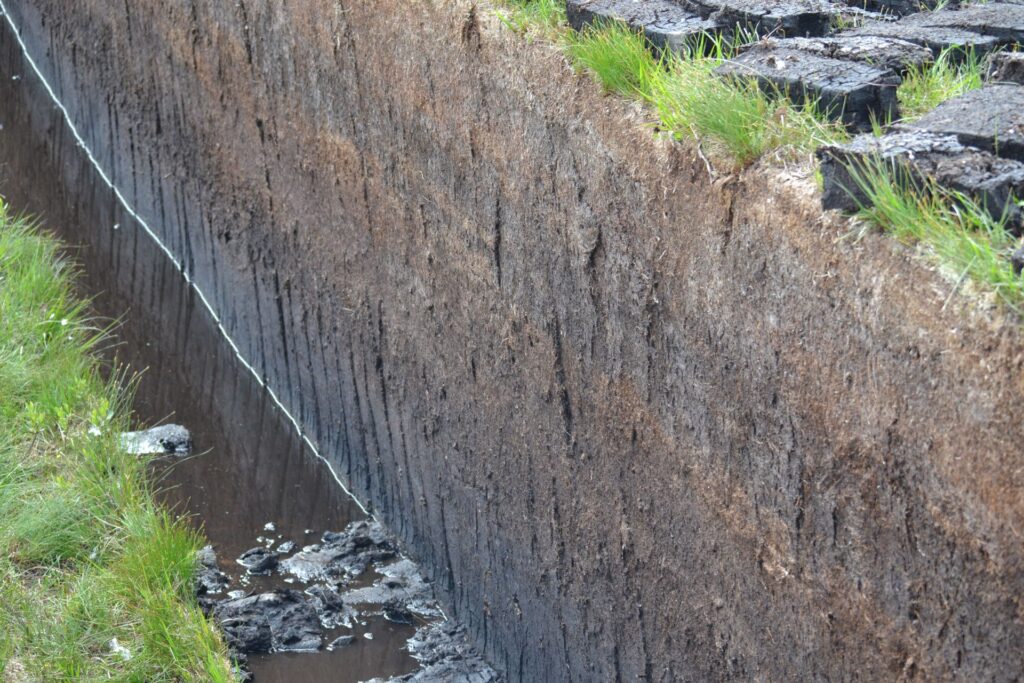
Notably, while both firmly opposed the idea, neither Wills at Kilchoman nor McEachern at Bruichladdich said their companies would be forced to shut down altogether in the event of a peat sale ban. “At the end of the day, businesses will survive,” said McEachern. Instead, they offered a more measured assessment than the doomsday predictions of mass layoffs and distillery closures presented by some respondents to the government’s consultation. This makes sense because, in reality, huge quantities of whisky are already produced in Scotland with no peat whatsoever, especially in the Speyside and Lowland regions, but even on Islay too. The Bunnahabhain distillery on Islay’s northeastern coast, for example, stopped using peat in the 1960s and, far from suffering, saw its sales surge. (It reintroduced peat in some of its malts decades later.) Both Kilchoman and Bruichladdich themselves produce unpeated whiskies as well as peated ones, as does Caol Ila, Islay’s largest distillery by volume. Nonetheless, it is true that most blended Scotch contains at least some peated whisky, and nobody disputes that the taste and character of these blends would change substantially without the peat. And it goes without saying that the Islay distilleries best known for their strongly peated single malts — the likes of Laphroaig, Ardbeg, Bowmore and Lagavulin — would stand to suffer most in the event of a ban.

Faced with this dangling sword of Damocles, what are distilleries doing to mitigate the risks — to their businesses, their employees and their whiskies?
Some have begun experimenting with alternatives to peat, smoking their barley with substances including alder wood, birch bark, heather and juniper berries. A few bold pioneers have even tried sheep dung, such as the Belgrove distillery in Tasmania, Australia, which produces the aptly named “Wholly Shit” rye whisky smoked with nothing but ovine feces. (In his “Whisky Bible 2024,” the bestselling critic Jim Murray gave it a rave review, enthusing that the smoke “lingers and lingers and lingers.” One can imagine.) There is also talk of artificially synthesizing the peat smoke flavor using phenolic compounds drawn from other sources. But — Tasmanian rye aside — few of these efforts have met with much success thus far, and those to whom New Lines spoke on Islay were skeptical of the overall prospects.
“It doesn’t matter what you come up with,” Wills said. “It’s never going to be the same.”

One concrete step taken recently at the industry-wide level was the publication in 2023 by the Scotch Whisky Association of a “Commitment to Responsible Peat Use.” This six-page document, since adopted by most of Scotland’s distilleries, acknowledges that peatlands constitute “some of the most valuable ecosystems on Earth” and “are our most effective terrestrial carbon store.” Accordingly, it outlines actions that whisky-makers should take “to protect, restore and sustain Scotland’s peatlands,” emphasizing three areas of focus above all: responsible peat extraction methods, optimizing the malting process to attain the greatest efficiency from the peat used and contributing to peatland restoration efforts.
The problem, say peatland scientists, is that such efforts, while welcome, are much too little and too late to suffice against the existential scale of the climate crisis. A case in point is the St. Fergus Moss in Aberdeenshire, the largest single source of peat used in the whisky industry worldwide. It is from here that Northern Peat & Moss — which, since 2012, has owned exclusive rights to extract peat from the site until 2032 — digs up some 6,000-7,000 tons of dry peat every year. Of that, more than 4,000 tons goes into whisky, flavoring the malts of Bruichladdich, Chivas Brothers and countless other distilleries, including some as far afield as India, Japan and Australia. “The vast majority of whisky distilled using peated malt contains our peat,” boasts the company’s website, “both in Scotland and around the globe.”
When its license to extract from St. Fergus expires in 2032, Northern Peat & Moss has committed to restoring such peatland as is left after 20 years of systematic, machine-aided removal. The restoration plan involves “blocking the drainage ditches which currently allow us to work the bogs with large machinery,” said Lesley Craig, the company’s manager, in an email to New Lines. “This will cause the water table to rise and create a wetland habitat which will in turn encourage the growth of species such as sphagnum moss. Over time, peat will start to form again. We are currently restoring previously worked areas of bog that we own using this method with great success.”
A worthy endeavor, perhaps, though some simple arithmetic illustrates its limitations. If, as Craig says, the company typically extracts 3 or 4 inches of peat from St. Fergus each year, then, at a rate of about 1 inch every 25 years, it would take around 1,400 to 1,800 years to fully replenish the 55 to 70 inches removed over the duration of the 20-year license. Meanwhile, starting in 2032, the company hopes to extract more peat from a new site, further depleting the overall stock and detonating another “carbon bomb” into the atmosphere — though, at the time of writing, it had not yet secured permission to do so.
“We do not have any new site to move to after our planning permission expires,” Craig told New Lines. “We have been told repeatedly by environmental bodies and government agencies that extracting on new sites will not be permitted. I think the Scotch whisky industry is waking up to their predicament and hopefully the Scottish government will see that some peat extraction is necessary as whisky is a huge part of the Scottish economy.”
Indeed, defenders of the whisky industry often call for perspective when the peat question is posed. That all of Scotland’s distilleries combined burn through an estimated 7,000 to 9,000 tons of dry peat every year may sound like a lot, yet it accounts for less than 5% of the total quantity of peat extracted annually in Scotland. While the whisky industry, as Kilchoman’s Wills puts it, “gets it in the neck” for its use of peat, there is a feeling among distillers that there is less outcry about its other, much more substantial consumers, such as the horticulture industry, which is responsible for over 90% of Scottish peat extraction.
“Why is the focus on the 1% and not the 100%?” asked Bruichladdich’s McEachern. “There’s massive [capital expenditure] projects going on around Scotland just now that you can find with a simple Google, where you see huge amounts of peat being torn out of areas, loads of carbon released … and disposed of to build, whether it’s wind farms or it’s whatever other project. So we’ve got to be very careful that we don’t just put the focus on the whisky industry and say, ‘Whisky industry bad because peat is used,’ and actually put a focus on the whole problem, the 100%.”
There is truth to this, conceded Gallego-Sala, who acknowledged that whisky was “a small part of a large problem.” Yet the ecosystems professor was quick to add that this did not give distilleries carte blanche to act as they pleased. “We all have a responsibility to do what we can to emit less CO2 and degrade nature as little as possible,” she told New Lines in an email. “This includes any activity. We are already focussing on restoring degraded peatlands, but this does not mean we can just continue degrading — the point is to minimise degradation.”

Is there anything else distilleries could be doing, then, beyond restoration, short of ceasing to use peat altogether? One creative proposal suggested by Clifton Bain, former director of the International Union for Conservation of Nature U.K. Peatland Programme, is that they extract peat only from sites that are already degraded, since these are anyway likely to be emitting carbon rather than storing it. The priority, stressed Gallego-Sala, is to preserve the peatlands that are already in pristine condition, since it is costly and time-consuming to restore them once they degrade — if it is even possible at all.
Gallego-Sala also favors the efforts made by various distilleries and maltsters to improve the efficiency of their peat use, yielding more smoke and flavor from the same quantity of peat by methods including crushing the barley prior to smoking it to increase absorption. Finding such ways to optimize the process is, indeed, one of the three core components of the Scotch Whisky Association’s “Commitment to Responsible Peat Use.”
In the end, it may be whisky consumers, rather than producers, who drive the change. Over the past two years, visitors to Kilchoman have increasingly asked about the environmental impact of peat use when touring the grounds, Wills told New Lines. Standing by a calm sea at Laphroaig, watching (and smelling) silver peat smoke billowing out of the roaring kiln overhead, filling the bay with its perfume, I heard a tourist explaining peatland restoration methods to another. At Lagavulin, our guide took care to emphasize to the assembled American, Canadian, French and Polish vacationers that the distillery adhered strictly to all peat sustainability guidelines.

As not just climate scientists but ordinary members of the public grow better informed about the issue, they will reach their own decisions about the levels of peat consumption they deem acceptable — and choose their whisky brands accordingly.
“The question becomes,” Gallego-Sala said, “how much are you prepared to pay (not just in monetary terms, but in ‘your children’s future’ terms) to have this amazing taste?”
It’s a question I have had to confront myself with greater urgency, the more I have learned about the subject. Scottish on my mother’s side, I acquired a patriotic thirst at the onset of adulthood for what the national poet Robert Burns called his “muse,” and it has long been to the peaty drams of Islay that I have had most recourse. For nearly two decades, almost every significant occasion has been consecrated with a smoky snifter: a child born, a book published, a close brush with a Beirut bomb, a friend’s death, my wedding. It’s a rite of sorts, a sacrament, a baptism by the water of life. Is it so important, though, that I’m willing to go on harming the planet for it, with consequences for the world my young son and daughter will grow up to inhabit? This is the dilemma with which every Scotch drinker must now wrestle, as they peer into the swirling depths of the potion in their glass, filling their lungs with the ancient incense of thousand-year-old peat.
This article was published in the Fall 2024 issue of New Lines‘ print edition.
Become a member today to receive access to all our paywalled essays and the best of New Lines delivered to your inbox through our newsletters.



